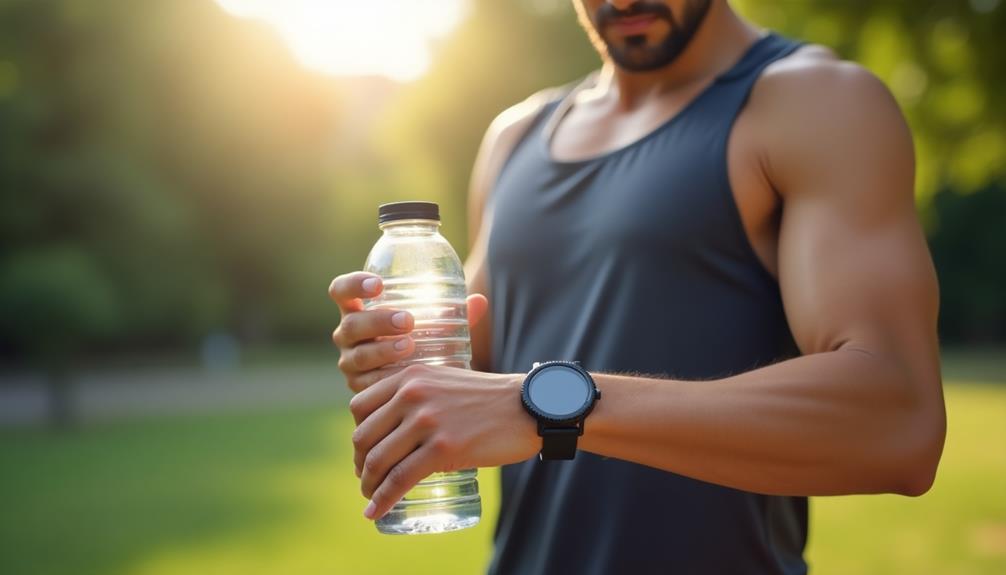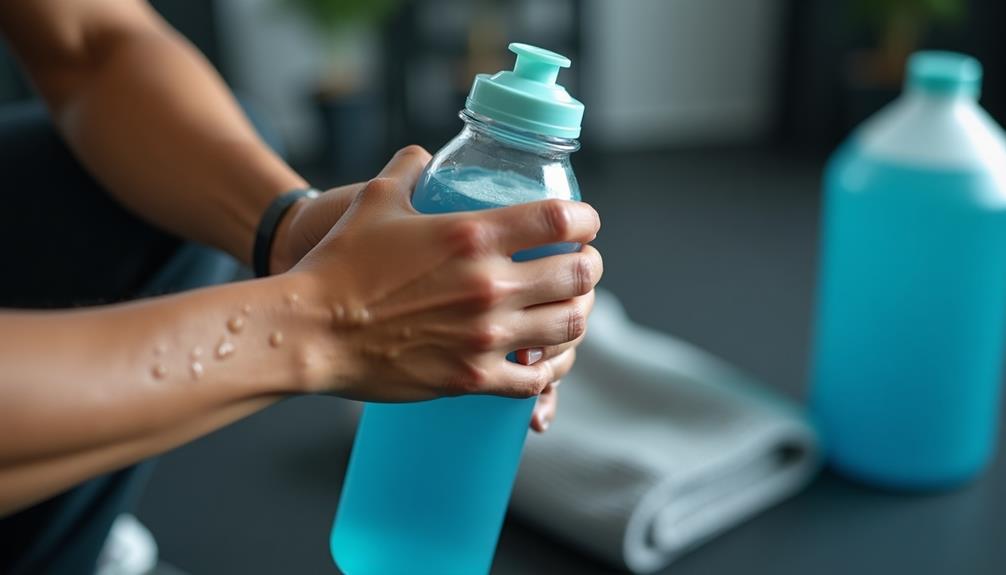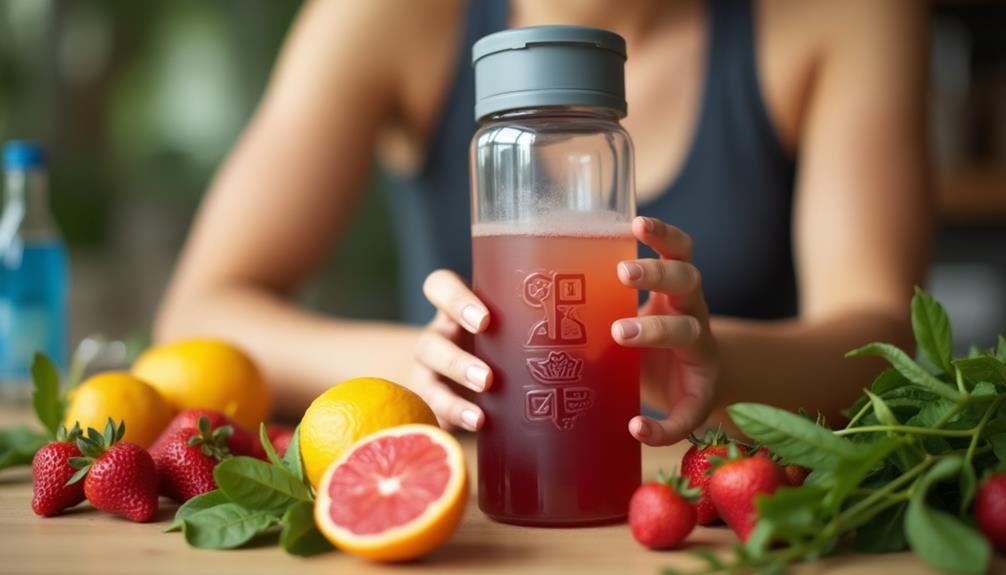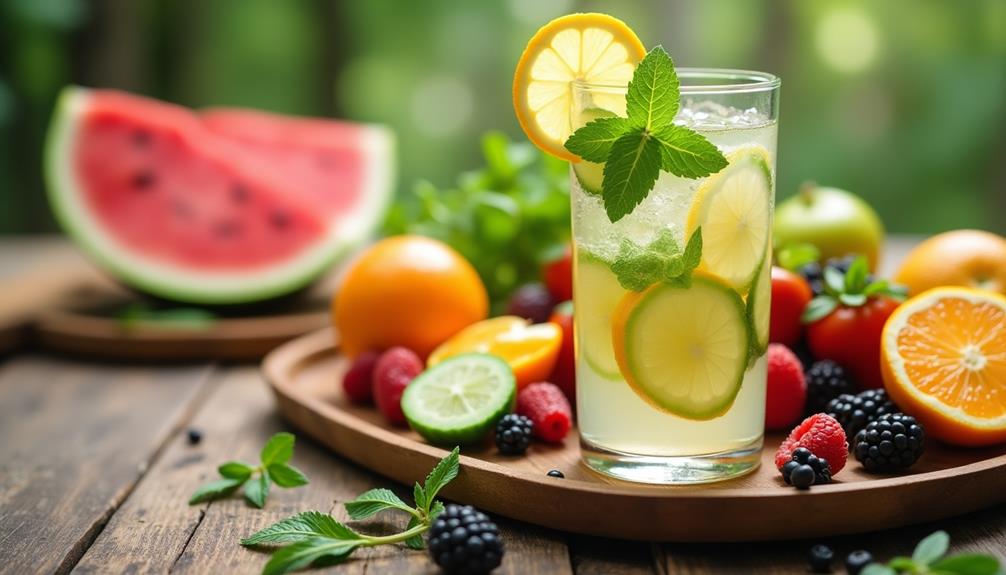To improve muscle recovery through hydration, focus on these essential strategies. First, understand your hydration needs by monitoring fluid loss during workouts. Next, choose the right fluids—water is vital, but consider coconut water or electrolyte drinks for added benefits. Time your hydration: aim to rehydrate within 30 minutes post-exercise. Incorporate electrolytes like sodium and potassium to support recovery and prevent cramps. Don't forget hydration tools like bottles or apps to track intake, and in addition, nourish yourself with hydrating foods such as fruits and vegetables. These strategies will greatly enhance your recovery process. More insights await!
Core Insights
- Rehydrate within 30 minutes after workouts to support muscle recovery and reduce soreness.
- Monitor urine color to gauge hydration levels and adjust water intake accordingly.
- Incorporate natural sources of electrolytes, like coconut water, to replenish essential minerals.
- Drink water consistently throughout the day, especially during intense workouts or hot conditions.
- Use hydration powders or sports drinks post-workout to balance nutrients and enhance recovery.
Understand Your Hydration Needs

To effectively recover from intense workouts, you need to understand your hydration needs. Hydration plays a pivotal role in muscle recovery. When you exercise, you lose fluids through sweat, and replacing those fluids is essential. Start by monitoring your body's signals. Thirst is an obvious indicator, but don't rely solely on it. Check the color of your urine; pale yellow usually means you're well-hydrated. Aim to drink water consistently throughout the day, not just during workouts. Consider factors like temperature and workout intensity, which can increase your fluid requirements. Electrolyte-rich options like coconut water can provide additional benefits for muscle recovery and hydration. Some brands offer natural electrolytes and vitamins that support post-workout recovery. Remember, adequate hydration helps transport nutrients to your muscles and facilitates recovery. By understanding these basic hydration needs, you set the foundation for effective muscle recovery.
Choose the Right Fluids

Choosing the right fluids can greatly enhance your muscle recovery. Start with water, as it's essential for rehydrating after physical activity. However, water alone might not suffice. Consider adding electrolytes, especially if you've sweated a lot. Sports drinks can replenish lost salts and minerals, but watch out for added sugars. For optimal performance, you may want to explore hydration powders that offer a balanced blend of electrolytes and nutrients without excess calories.
Coconut water is a great natural alternative, offering electrolytes without excessive sugar. If you're looking for something more substantial, protein shakes can aid recovery by providing the necessary amino acids.
Keep in mind your personal preferences and dietary restrictions when selecting fluids. Finding the right balance of water, electrolytes, and nutrients will help you recover faster and feel better after your workouts. Stay mindful of what you consume!
Time Your Hydration

After exercising, rehydration is vital. You need to replace lost fluids to kickstart recovery. While water is essential, protein-rich options can also aid in muscle recovery and replenishment. Ideally, drink water or other hydrating fluids within 30 minutes post-workout. This window is when your body is most receptive to replenishment. By timing your hydration correctly, you'll support muscle recovery, reduce soreness, and improve your overall performance in future workouts. Prioritize hydration, and your body will thank you.
Incorporate Electrolytes

Hydration isn't just about water; incorporating electrolytes into your post-workout routine can greatly enhance recovery. Electrolytes, like sodium, potassium, and magnesium, help balance fluids in your body. They play an essential role in muscle function and nerve signaling.
After intense exercise, you lose these essential minerals through sweat. To replenish them, consider adding electrolyte-rich drinks or snacks to your recovery plan. Sports drinks, coconut water, or even a sprinkle of salt on food can do the trick.
Aim to consume these electrolytes soon after your workout. This helps prevent cramping and supports your recovery process. By focusing on both hydration and electrolytes, you'll optimize your body's ability to recover and prepare for your next workout.
Monitor Fluid Loss

| Activity | Estimated Fluid Loss | Recommended Rehydration |
|---|---|---|
| Light jogging | 0.5 – 1 liter | 0.5 – 1 liter |
| Intense cycling | 1 – 2 liters | 1 – 2 liters |
| Weight training | 0.5 – 1.5 liters | 0.5 – 1.5 liters |
| Running (5K) | 1 – 2.5 liters | 1 – 2.5 liters |
| Hot yoga | 1 – 2 liters | 1 – 2 liters |
Keep a water bottle handy and drink regularly to maintain peak hydration levels.
Use Hydration Tools

When it comes to effective muscle recovery, utilizing hydration tools can make a significant difference in your performance and well-being. First, consider using a water bottle with measurement markers. This helps you track your fluid intake throughout the day. Next, invest in a hydration backpack for long workouts or hikes, ensuring easy access to water.
Electrolyte tablets or powders are also beneficial, allowing you to replenish essential minerals lost during exercise. Finally, a smart hydration app can remind you to drink water regularly, helping to establish a consistent routine. By incorporating these tools, you'll enhance your hydration strategy, supporting your muscle recovery efforts effectively and efficiently.
Nourish With Hydrating Foods

To optimize muscle recovery, you can't overlook the role of hydrating foods in your diet. Incorporating fruits and vegetables with high water content can greatly support your hydration efforts. Watermelon, cucumbers, oranges, and strawberries are excellent choices. These foods not only hydrate but also provide essential vitamins and minerals that aid recovery.
Aim to fill your plate with a variety of these hydrating options. You can toss them in salads, blend them into smoothies, or enjoy them as snacks. Additionally, consider incorporating soups and broths, which can be both nourishing and hydrating.
Frequently Asked Questions
How Does Hydration Affect Muscle Soreness After Workouts?
Hydration plays a vital role in muscle recovery. When you're well-hydrated, your muscles stay nourished and repair faster, reducing soreness. If you don't drink enough water, you might experience increased discomfort after workouts.
Can I Rely on Thirst to Gauge Hydration Needs?
"You can't always trust your gut." Thirst isn't a reliable gauge for hydration needs. Your body may already be dehydrated by the time you feel thirsty, so it's wise to drink water regularly throughout the day.
What Are the Signs of Dehydration During Exercise?
During exercise, you might notice signs of dehydration like dry mouth, fatigue, dizziness, or reduced performance. If you're feeling unusually thirsty or your urine's dark, it's time to rehydrate and replenish your fluids.
Is It Possible to Overhydrate?
You might think more water's always better, but overhydration can lead to serious issues. It dilutes electrolytes, causing confusion and swelling. So, balance is key—listen to your body and drink wisely, not excessively.
How Do Different Climates Impact Hydration Strategies?
Different climates affect your hydration needs noticeably. In hot, humid conditions, you sweat more, so you've gotta drink more fluids. In cold, dry climates, you might not feel thirsty, but your body still needs hydration.

